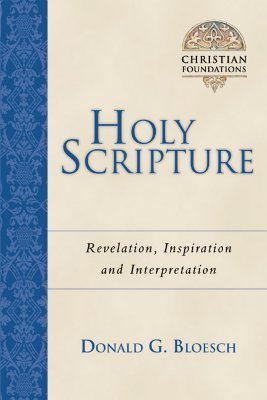I don’t think Bloesch gives me all the answers (a little too Barthian on natural theology for my taste), but he does provide me with a passionate and intelligent space to live out my evangelical faith. His openness to the conclusions of various critical methodologies allow me the liberty to take seriously the questions and answers that seem to force themselves on me from academic spaces. However, his theology of Word and Spirit is totally orthodox and pious. He got me excited about the Bible in a way I haven’t felt in a while, reminding me of the unexpected, sovereign, gracious power of the Holy Spirit working through the biblical text.
I didn’t read him closely enough to think through too many of the issues, but these are the takeaways I have after one quick read:
- Inerrancy: Bloesch clarifies for me that there are 4 ways of interacting with inerrancy. 1 is to affirm it and interpret the Bible literalistically. This is intellectual suicide. 2 is to affirm it but qualify it with a careful understanding of genre common sense and stuff like that. Think Packer or Erickson. 3 is to deny it in empirical (scientific or historical) matters but basically affirm it in a theological way. This is the way Bloesch sees it. 4 is to deny it outright and affirm the Bible as a human witness without a divine voice. Options 2 and 3 are really not that far from each other in the conclusions they draw (how different is Bloesch from someone like Packer or Bavinck, really?). At the moment, I think 3 is probably the most true, but I’m not sure. Basically Bloesch argues inerrancy as historically understood is defensible, but in the post-enlightenment world, the term has been co-opted and does not mean what it used to. From what I understand, this is basically Berkouwer’s view.
- Myth: Bloesch blessed me immensely by his acceptance of mythological language in the Bible, even in the gospels. This isn’t anything crazy and the Bible is still rooted in God’s mighty deeds in history, but these events are narrated to us in mythological language (if you want to quibble on the term, Bloesch is fine with something different). I wonder how this compares with Meir Steinberg’s proposal that the Bible is a blend of history, theology, and poetics. No easy answers on where to draw the line here, but it does give me the freedom to think and question.
I know many traditional evangelicals will be very concerned with Bloesch’s proposals here. I certainly don’t think he’s got everything figured out. But at this moment, I just fail to see how Bloesch is that far off the mark. Perhaps it is possible to qualify inerrancy enough to make it rationally acceptable. If so, that is probably the best way forward. Bloesch himself says that traditional evangelical theology makes the theological task more simple. But I gotta feel like this is definitely a work of Catholic, orthodox, and evangelical theology.
Quotes to get a taste:
Yet our final authority is not what the Bible says but what God says in the Bible. To be sure, God says what his witnesses say, but he says much more. Indeed, some things that his witnesses say fall short of the full picture that God invites us to see.
Our final authority is not the Bible as a book or the Bible in and of itself but the Bible penetrated by the Spirit and discerned by Spirit-filled people.
It should be noted that Jesus, Peter and Paul appealed to extant copies, not to the autographs.
I agree that the people of ancient Israel entertained numerous misconceptions conceptions of God as well as antiquated and even sub-Christian notions of human life and destiny. Yet such notions, which belong to a past time and culture, still have a place in the total biblical panorama, for they direct us to the center and apex of biblical history-the self-revelation of the living God in the person and work of Jesus Christ.
We are given in the Bible not a fully developed metaphysical worldview but a divine message and a divine imperative that nevertheless have metaphysical implications.
Historical exegesis gives us the literal sense of the passage, what the author actually said. Theological exegesis or exposition tells us what the author was trying to say, what he was pointing toward.
Myth in the Bible does not mean that the events depicted have no basis in reality-only that they are set forth in dramatic, imaginative language. The stories may have a firm anchor in history, yet at the same time contain legendary elements.
I believe the hope of theology rests on a genuine evangelical renaissance, but such a renaissance will not happen until evangelicals break out of their epistemic bondage to Enlightenment rationalism and their cultural bondage to patriarchalism and capitalism.

